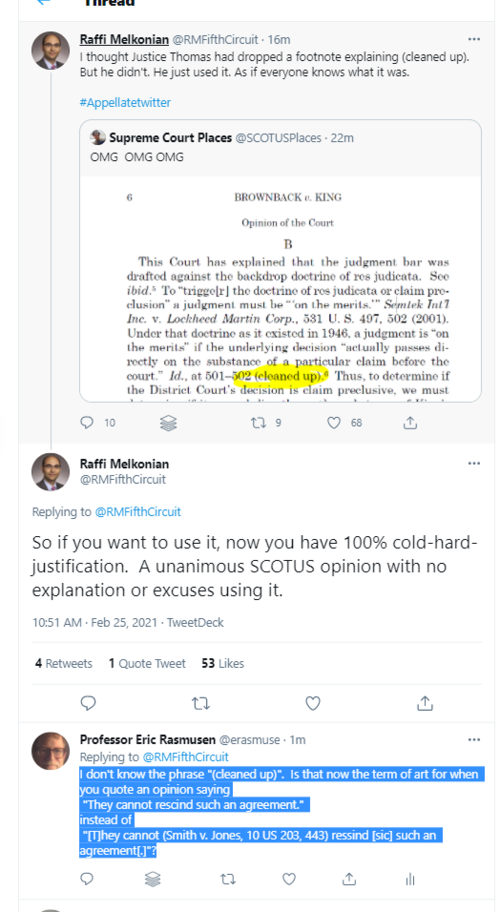Quotation style
We must be accurate but not pedantic in quotations. Always, your thought should be on what the reader needs to accurately and smoothly comprehend what the original was saying.
"Cleaned Up"
Citations
Citations to discussion boards should be in a footnote, the same as with "personal communication from John Smith, Dec. 2, 2020", magazine articles, and blogposts. Don't list the pseudonym, just credit "an anonymous post at Economics Job Market Rumors".
Quotation Marks
It is awkward dealing with quotation marks within quotation marks. The convention is to use double quotation marks on the outside and single quotes on the inside, but I'm not sure that's optimal. I think it is a Changeable rule; that is, if a writer uses a different but transparent and good convention, the reader will accept it without thought.
Consider, replacing "ZZ" by "<<" (because "<<" is apparently a control character in a quote),
(1.1) ZZ I chat-boxed ("Have you posted the paper?") and later "raised my hand" and out loud made substantive ("Your data also says X") and practical ("You should list your references after the appendix instead of before") comments.>>
Sentence (1.1) uses double inequalities on the outside instead of double quotes. I think that's used in some foreign countries for quotations generally.
Formatting
This can be changed, usually. Consider, from Wikipedia's Kairos:
"Kairos" (used 86 times in the New Testament)[19] refers to an opportune time, a "moment" or a "season" such as "harvest time," [20] whereas "chronos" (used 54 times)[21] refers to a specific amount of time, such as a day or an hour (e.g. Acts 13:18 and 27:9).
This is better done as
"Kairos" (used 86 times in the New Testament) refers to an opportune time, a "moment" or a "season" such as "harvest time," whereas "chronos" (used 54 times) refers to a specific amount of time, such as a day or an hour (e.g. Acts 13:18 and 27:9).
Although proper in legal briefs, where exactitude is more important than clarity, in other contexts it is pedantic to write:
"Kairos" (used 86 times in the New Testament) refers to an opportune time, a "moment" or a "season" such as "harvest time," whereas "chronos" (used 54 times) refers to a specific amount of time, such as a day or an hour (e.g. Acts 13:18 and 27:9). [citations omitted]
Omitted words
If you omit the first words of a sentence, the pedantic style, one proper for legal brief but not for other writing, including scholarly writing, is to indicate that like this one from Wikipedia's Kairos:
"... [T]he word refers more to proportion, the mean, and the implicit sense of right measure."
It is better just to change without indication, because the reader is distracted by the bracketed original letter and in 99.99% of cases he doesn't care that you omitted the first word. If you think he would care, then tell him about it in a footnote instead, like this:
"The word refers more to proportion, the mean, and the implicit sense of right measure."<ref> Wikipedia, Kairos, viewed Boxing Day, 2020. The original says, "Here the word refers more to proportion, the mean, and the implicit sense of right measure."</ref>
[https://papers.ssrn.com/sol3/papers.cfm?abstract_id=2935374 "Cleaning Up Quotations," 18 Journal of Appellate Practice and Process 143 (2017) Jack Metzler]
"Use of (cleaned up) signals that to improve readability but without altering the substance of the quotation, the current author has removed extraneous, non-substantive clutter such as brackets, quotation marks, ellipses, footnote signals, internal citations or made un-bracketed changes to capitalization /17, slip op. at 23 n.5 (Md. filed"
See Professor Eugene Volokh on this at https://reason.com/volokh/2021/03/12/cleaned-up-parenthetical-arrives-in-the-supreme-court/.
